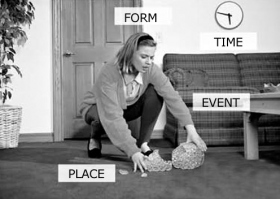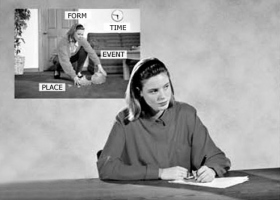It has been longstanding knowledge in Scientology that in the presence of overts and withholds, abbreviated “O/Ws,” no gains (improvements) occur.
Overts are the biggest reason a person restrains and withholds himself from action.
A person who has overts and withholds becomes less able to influence his own life and the lives of others around him and falls out of communication with those people and things he has committed overts against.
Writing up one’s overts and withholds offers a road out. By confronting the truth an individual can experience relief and a return of responsibility.
Basic Theory
The theory behind the action of writing up one’s overts and withholds is contained in the Scientology
A portion of Axiom 38 of the Scientology Axioms is particularly applicable:
1: Stupidity is the unknownness of consideration.
2:
1: Truth is the exact consideration.
2: Truth is the exact time, place, form and event.
Thus we see that failure to discover Truth brings about stupidity.
Thus we see that the discovery of Truth would bring about an
As-isness is the condition in which a person views anything exactly as it is, without any distortions or lies, at which moment it vanishes and ceases to exist.
Thus we see that an Ultimate Truth would have no time, place, form or event.
Thus, then, we perceive that we can achieve a persistence only when we mask a truth.
Lying is an alteration of time, place, event or form.
Lying becomes
Anything which persists must avoid As-isness.
Thus, anything to persist must contain a lie.
Writing up one’s overts and withholds can accomplish an As-isness and thereby relieve a person of the burden of his transgressions.
Format for Writing O/Ws
When people do O/W write-ups, abuses can occur if the specifics of the action are not known and followed.
The first step to be done before one undertakes the action of an O/W write-up is to clear up the procedure of exactly how such write-ups are done.
Experience has proven that people have run into trouble on O/W write-ups when the format (including the key words and terms) was not word cleared before embarking on the action. (
place: the location of occurrence or action; a specific location; a particular position or point in space.
form: the arrangement of things. The particular character, nature or structure of a thing.
event: something that happens or comes to pass; a distinct incident; a thing that takes place.
Format:
The format for writing up one’s overts of omission, overts of commission or withholds is as follows:
1. Write down the exact overt or withhold.
2. Then state explicitly the specifics regarding the action or inaction, including:
a. time
b. place
c. form
d. event.
Example:
“1. I hit a friend’s car when backing out of my parking space at work and caused about five hundred dollars worth of damage to his car.
“2. On the 30th of June 1980, when I was leaving work, I was backing out of my parking space and hit the back end of my friend Joe’s car. There was no one else around and the parking lot was almost empty. I drove away, without leaving a note or telling Joe, knowing that I caused about five hundred dollars damage to his car which he had to pay for.”
Example:
“1. I cheated on my wife (Sally) by seeing another woman and never told her about this.
“2. Three years ago, when I was first married to Sally, I cheated on her by seeing another woman. I have never told Sally about this. One morning in June 1980, I had told Sally I would take her to the movies that night. On my way home from work, when I was at Jones’ Department Store, I saw an old girlfriend of mine (Barbara). I asked Barbara to go out to dinner with me that night and she accepted (she did not know that I was married). I told her I would pick her up at 8:00 P.M. that night. When I got home from the store, I told Sally I had to go back to work to get some things done and would not be able to go to the movies with her. I then went out to dinner with Barbara in another city (at the ‘Country Inn’) so I would not risk seeing any of my friends.”
Administering O/W Write-ups
The action of writing up one’s overts and withholds can be applied to anyone, and the breadth of its application is unlimited.
Examples:
A person is not correctly performing the duties of his job and has to be
A person is brutally critical and leaves a training program he is on. The person in charge of the training activity has him write up his O/Ws.
It could be that a person is being very critical and fault-finding. He could experience relief from writing up his O/Ws.
The following steps are the procedure for getting a person to do an O/W write-up:
1. The first action is for the person administering the O/W write-up to: (a) study and word clear this course (by “word clear” is meant define, using a dictionary and the course glossary, any words not fully understood), (b) clear the words included in step 4 below, (c) word clear the O/W write-up format.
2. Ensure that a space is provided where a person can write up his overts and withholds undistracted.
3. Provide paper and pen.
4. Have the person clear the following words, as defined in the text of this course: overt, withhold, motivator, justification, overt–motivator sequence.
5. Have the person read this section and
6. Have the person write up his O/Ws, exactly per the O/W write-up format above.
In doing an O/W write-up a person writes up his overts and withholds until he is satisfied that they are complete. The person will feel very good about it and experience relief. One would not engage in carrying on an O/W write-up past this point.
When he has finished, have him give the O/W write-up to you. Read the write-up, ensuring the format was used, and thank him for writing these up. This acknowledgment is important as it lets the person know his communication has been received by someone. There should, however, be no comments or opinions expressed about the content of his write-up.
Once
Writing up one’s overts and withholds is a simple procedure with unlimited application. A husband and wife could write up their overts and withholds on their marriage. An employee could write up his O/Ws concerning his job. A rebellious student could write down his transgressions at school.
One can straighten out any area of life by coming to grips once and for all with one’s violations against the various moral codes to which he agreed and later transgressed. The relief which can accompany the unburdening of one’s misdeeds is often very great. One can again feel a part of a group or relationship and regain respect for oneself, the trust and friendship of others and a great deal of personal happiness.
This is extremely useful technology.
statements of natural laws on the order of those of the physical sciences.
called “mechanical” as it is defined in terms of distance and position. Mechanical in this sense means interpreting or explaining the phenomena of the universe by referring to causally determined physical forces; mechanistic. Mechanical also applies to “acting or performing like a machine—automatic.” Thus, a Mechanical Definition would be one which defined in terms of space or location such as “the car over by the old oak tree” or “the man who lives in the big house.” Here “the old oak tree” and “the big house” are fixed objects and the unfixed objects (“car,” “man”) are a sort of viewpoint. One has identified things by location.
the condition in which a person views anything exactly as it is, without any distortions or lies, at which moment it vanishes and ceases to exist.
an altered or changed reality of something. See also reality in this glossary.
the subject and action of clearing away the ignorance, misunderstoods and false definitions of words and barriers to their use.
jump the proper person in a chain of command.
define or cause to be defined, using a dictionary, any words not fully understood in the material a person is studying.
give (someone) an acknowledgment, something said or done to inform another that his statement or action has been noted, understood and received.





